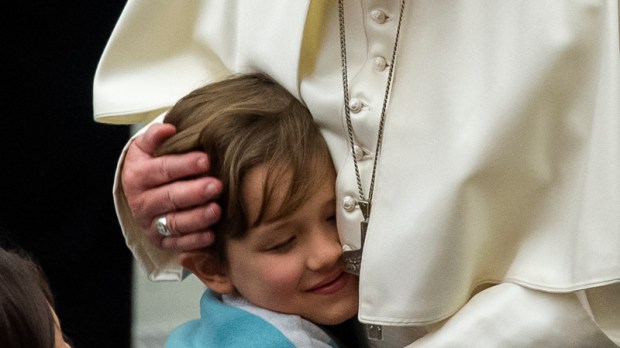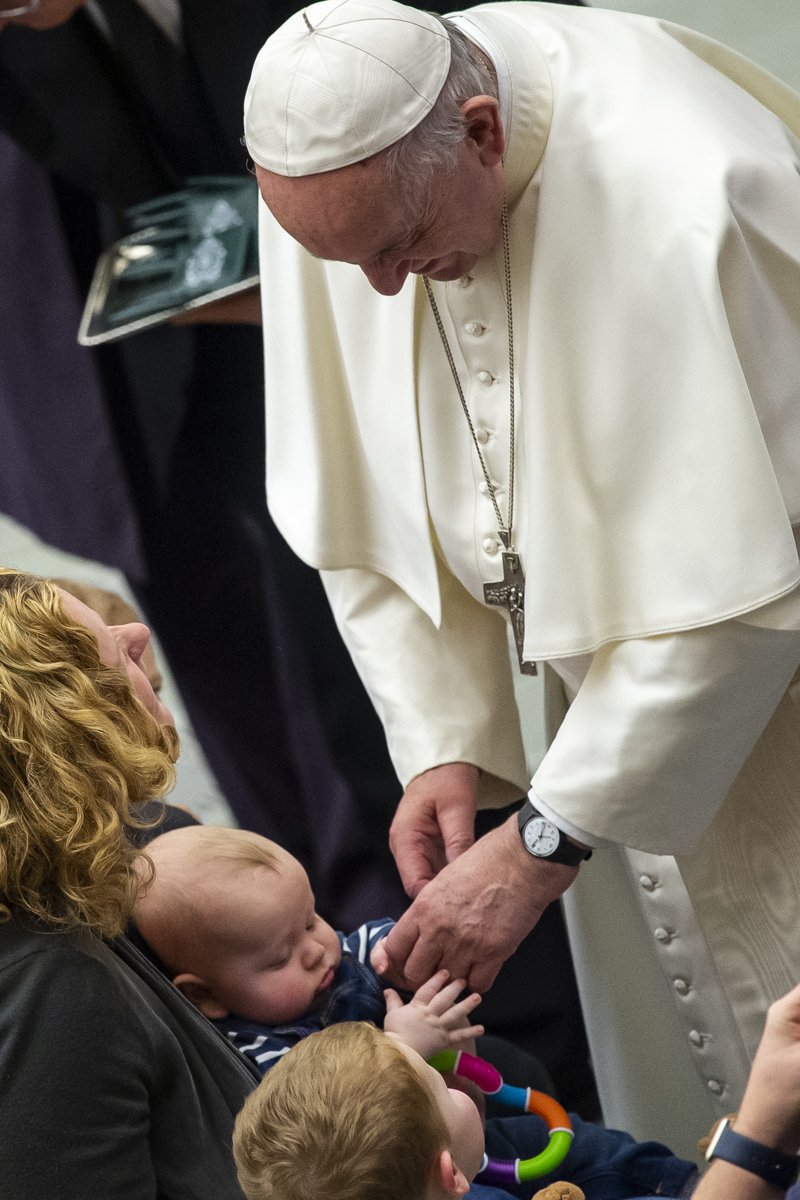The pope today continued his Wednesday general audience series on the Our Father. The full text is below. Here are a few of the overarching themes:
~ Jesus is praying for us right now. “And we can also say to Jesus: ‘You are praying for me; continue to pray as I am in need.’ Like this. Be courageous.”
~ “Jesus’ prayer appears to subdue the most violent emotions.” This is reflected in how he lives the moments of his Passion with “a surprising calm.”
~ Jesus himself will educate us in how to pray. “To give us trust, Jesus explains some things … the attitudes of the believer who prays.”
~ “We can be sure that God will respond.” … “Prayer changes reality … Either it changes things, or it changes our heart, but it always changes.”
Dear brothers and sisters, good morning!
Today’s catechesis refers to the Gospel of Luke. Indeed, it is above all this Gospel, from the accounts of His childhood, that describe the figure of Christ in an atmosphere dense in prayer. Three hymns are included that mark the prayer of the Church every day: the Benedictus, the Magnificat and the Nunc dimittis.
And in this catechesis on the Lord’s Prayer we will go ahead, we will see Jesus as a man who prays. Jesus prays. In Luke’s account, for example, the episode of the Transfiguration springs from a moment of prayer. He says: “As He was praying, the appearance of His face changed, and His clothes became as bright as a flash of lightning” (Lk 9: 29). But every step of the life of Jesus is as if it were inspired by the breath of the Spirit that guides Him in all His actions. Jesus prays in the Baptism in the Jordan, dialogues with the Father before taking the most important decisions, often withdraws into solitude to pray, and intercedes for Peter who will deny Him shortly after. He says: “Simon, Simon, Satan has asked to sift all of you as wheat. But I have prayed for you, that your faith may not fail” (Lk 22: 31-32). This comforts: knowing that Jesus prays for us, prays for me, for each one of us so that our faith not be lacking. And this is true. “But father, does He still do it?” He still does it, before the Father. Jesus prays for me. Each one of you can say it. And we can also say to Jesus: “You are praying for me, continue to pray as I am in need”. Like this. Be courageous.
Even the death of the Messiah is immersed in an atmosphere of prayer, to the extent that the hours of the passion appear to be marked by a surprising calm: Jesus consoles the women, prays for his crucifiers, promises paradise to the good thief, and expires saying: “Father, into Your hands I commit my spirit” (Lk 23. 46). Jesus’ prayer appears to subdue the most violent emotions, the desires for vendetta and revenge, and reconciles man with his bitter enemy, reconciles man with this enemy, which is death.
It is again in the Gospel of Luke that we find the request, expressed by one of the disciples, to be able to be educated by Jesus Himself in prayer: “Lord, teach us to pray” (Lk 11: 1). They saw Him praying. “Teach us – we too can say it to the Lord – Lord you are praying for me, I know, but teach me to pray, so that I too may pray”.
From this request – “Lord, teach us to pray” – there arises a fairly extensive teaching through which Jesus explains to His followers with what words and sentiments they should address God.
The first part of this teaching is precisely the Lord’s Prayer. Pray in this way: “Father in heaven”. “Father”. That word it is so beautiful to say. We can remain all the time in prayer with that word alone: “Father”. And feeling that we have a father: not a master, or a stepfather. No: a father. The Christian addresses God, calling Him “Father”, first and foremost.
In this teaching that Jesus gives to His disciples it is interesting to focus on some instructions that crown the text of the prayer. To give us trust, Jesus explains some things. These insist on the attitudes of the believer who prays. For example, there is the parable of the importunate friend, who goes to disturb an entire sleeping family because a person has unexpectedly arrived from a journey and he has no bread to offer him. What does Jesus say to the one who knocks on the door, and awakens his friend? “I tell you, even though he will not get up and give you the bread because of friendship, yet because of your shameless audacity he will surely get up and give you as much as you need” (Lk 11: 9). With this He wishes to teach us to pray and to persevere in prayer. And immediately afterwards He gives the example of a father who has a hungry child. All of you, fathers and grandfathers, who are here, when your child or grandchild asks for something, is hungry, and asks and asks, then cries, calls out, is hungry: “Which of you fathers, if your son asks for a fish, will give him a snake instead?” (Lk 11: 11). And all of you have the experience: when your child asks, you give him what he asks for to eat, for his own good.
With these words Jesus lets it be understood that God always answers, that no prayer remains unheard: why? Because He is the Father, and He does not forget His children who suffer.
Certainly, these affirmations trouble us, because many of our prayers seem not to obtain any result. How often have we asked and not obtained – we have all experienced this – how many times have we knocked and found a closed door? Jesus recommends to us, in those moments, to insist and not to admit defeat. Prayer always transforms reality, always: if things do not change around us, at least we change, our heart changes. Jesus promised the gift of the Holy Spirit to every man and to every woman who prays.
We can be sure that God will respond. The only uncertainty is due to time, but let us have no doubt that He will respond. Perhaps we will have to persevere for a lifetime, but He will answer. He has promised us: He is not like a father who gives a snake in place of a fish. There is nothing surer: the desire for happiness that we all carry in our heart will be fulfilled one day. Jesus says. “Will not God bring about justice for His chosen ones, who cry out to Him day and night?” (Lk ,18: 7). Yes, He will do justice, He will listen to us. What a day of glory and resurrection that will be! Praying is even now victory over solitude and desperation. Pray. Prayer changes reality, let us not forget. Either it changes things, or it changes our heart, but it always changes. Praying is even now victory over solitude and desperation. It is like seeing every fragment of creation swarming in the torpor of a story whose reason at times we are at times unable to grasp. But it is in movement, it is in journeying, and at the end of every road, what is there at the end of our road? At the end of prayer, at the end of a time in which we are praying, at the end of life: what is there? There is a Father Who awaits everything and awaits everyone with open arms. Let us look to that Father.

Read more:
What is Jesus doing in the tabernacle? The Bible’s answer


